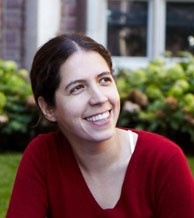Simine Vazire
 Washington University in St. Louis
Washington University in St. Louis
What does your research focus on?
My research examines people’s knowledge about their own personalities. Do people know how they behave? Do they know how others see them? I examine the discrepancies between how people see themselves and how others see them, and try to determine who is more accurate. I also examine whether people are aware of these discrepancies, and if so, how do they justify them? Finally, I’m curious about the processes that lead to these discrepancies – why do others sometimes know us better than we know ourselves?
What drew you to this line of research? Why is it exciting to you?
My interest in this topic started out as a methodological one – which are a better measure of personality, self-reports or peer-reports? Then I realized this question had important implications for self-knowledge, well-being, and interpersonal relationships. Who is the best expert on your personality? It’s one of those questions many people expect psychologists to be able to answer, but we really don’t know much about it.
Who were/are your mentors or psychological influences?
Sam Gosling was my graduate advisor and remains the biggest influence on my research and thinking. I also admire and am influenced by the work of David Funder, Del Paulhus, Will Fleeson, Laura King, and David Kenny.
To what do you attribute your success in the science?
Excellent mentors, collaborators, and graduate students. I’ve been extremely lucky on all three fronts, and there is nothing more important than the people you learn from. In graduate school I was lucky to “grow up” with great researchers and great people, including Matthias Mehl, Pranj Mehta, and Jason Rentfrow. I also owe a great deal of my success to my graduate students – they’re constantly teaching me new things. Finally, I have the great fortune to be in a department that is extremely supportive, with fantastic colleagues.
What’s your future research agenda?
I’m excited to see that self-knowledge is becoming an important subject of study across many areas of psychology – I hope it continues to grow. Personally, I’d like to understand why people can be blind to aspects of their personality that others can see. What purpose do these blind spots serve, are we better off without them, and how can we get rid of them?
Any advice for even younger psychological scientist? What would you tell someone just now entering graduate school or getting their PhD?
Surround yourself with smart, nurturing people who are passionate about what they do and generous with their time and ideas.
What publication you are most proud of or feel has been most important to your career?
I recently published a paper that presents the Self-Other Knowledge Asymmetry (SOKA) model. In it I try to account for the gaps between what people know about themselves and what others know about them. It’s a first stab at this thorny issue – I hope it serves as the foundation for future work.




APS regularly opens certain online articles for discussion on our website. Effective February 2021, you must be a logged-in APS member to post comments. By posting a comment, you agree to our Community Guidelines and the display of your profile information, including your name and affiliation. Any opinions, findings, conclusions, or recommendations present in article comments are those of the writers and do not necessarily reflect the views of APS or the article’s author. For more information, please see our Community Guidelines.
Please login with your APS account to comment.